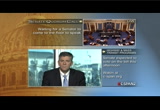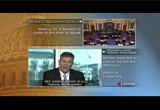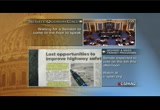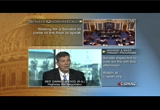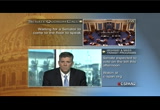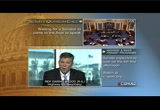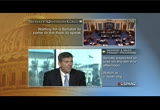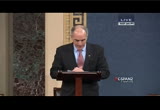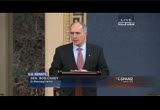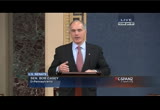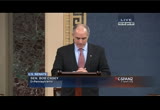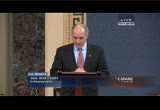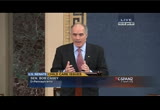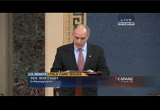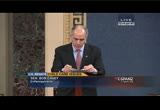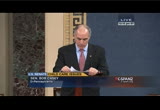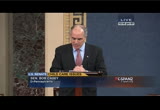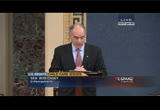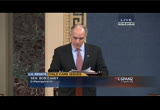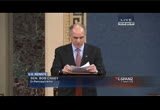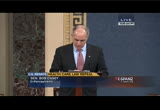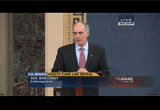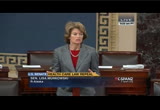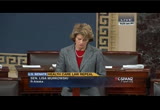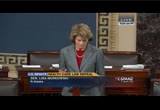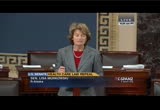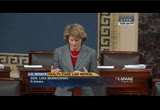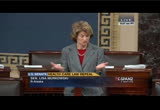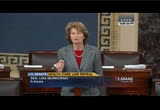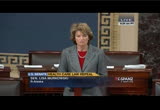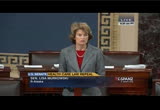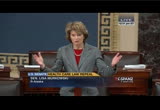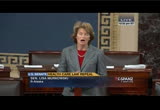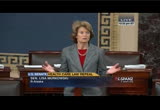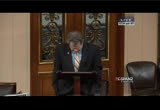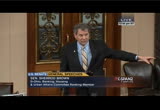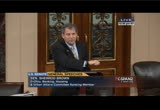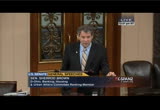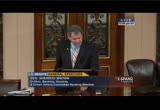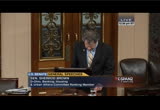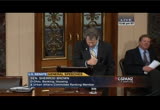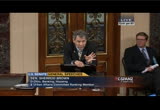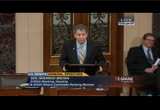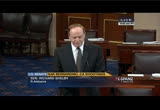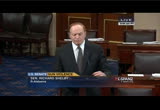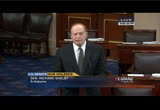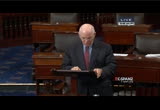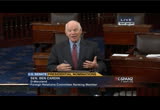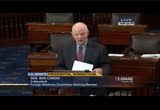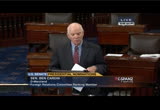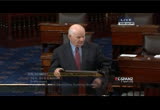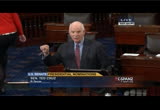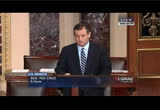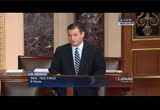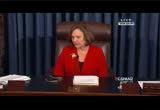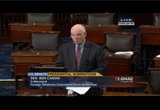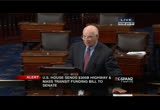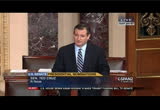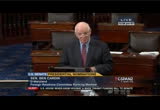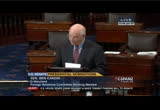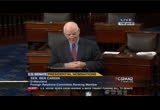tv US Senate CSPAN December 3, 2015 12:00pm-1:01pm EST
12:06 pm
12:07 pm
senate is in a quorum call. mr. casey: i ask that the quorum call be vitiated. the presiding officer: without objection. mr. casey: thank you very much. i rise to talk about some of the matters we're working on today with regard to votes that will take place later today. we now are in a period in our economic history where we've had a significant recovery but we still have aways to go and still have families across the country that are living with economic uncertainty. we can take steps today and certainty until the next couple of days and we hope in 2016 to ease some of that uncertainty to create more economic certainty for our families, especially middle-class families. one of the most important steps we can take to address some of the challenges that our families face is to boost middle-class
12:08 pm
incomes. the most significant challenge we have as a nation right now i believe over the long term is what will happen to incomes, especially what will happen to middle-class incomes over time. i have an amendment today that will address part of the solution or part of the strategy on raising incomes. one of those ideas is an expansion of the child and dependent care tax credit. this is a tax credit which helps families afford child care and so i'll talk about that for a couple of moments today, and then the other -- the other issue we're going to deal with is so-called dual earner tax credit which helps families who have young children and where both parents work outside the home. i don't think it's a news bulletin to anyone here or across the country that the cost of child care has skyrocketed, especially in recent years.
12:09 pm
a recent study by the pew foundation found that average weekly child care expenses rose 70% between 1985 and 2013. so the costs every week that a family is paying for child care is up basically 70% in 30 years or 25-30 years. that's one of the many costs that have gone up in the lives of middle-class families. so the child care costs have gone way up. the cost of higher education has gone way up in that -- in that time period. cost of health care, the cost of energy, the cost of food. it seems like for a middle-class family the -- every cost or every number you would hope would be going down or leveling off is going up. so as a result, child care is increasingly becoming really unaffordable for middle-class
12:10 pm
families. that's a reality in a context where we know that the cost is going up at a time when all the evidence shows that quality child care can have a substantially positive impact on a child's life. one of the reasons why quality child care from a child is because they have opportunities to learn. and what we've heard over and over again is that if our children learn more now, mean when they're in those early years, when they're in child care settings, they're going to earn more later. that direct linkage which all the evidence shows, all the day ashows, all the studies show, the linkage between -- all the data shows, all the studies show, the linkage between learning and earning is substantial. one of the best ways to make sure kids learn more now and earn more later when they're in the work force is to make sure that they have quality child
12:11 pm
care. just to give you one example, in pennsylvania, the average costs for full-time day care for an infant is $10,640 for an infant. for a four-year-old, it's $8,0 $8,072. those numbers sound almost like, you know, approaching college tuition maybe at some public universities. double-figure thousand dollar numbers for child care is almost hard to comprehend. $10,640 for an infant, $8,072 for a four-year-old. so what does that mean, for example, for married couples in pennsylvania? that means about 12% of their annual income is -- is dedicated to child care. how about for a single-parent family? a single mother, those numbers
12:12 pm
translate into 44% of her inco income. 44% of that the single mom's income going to child care. and she has to have it because she has to work. so this isn't something extra, something nice to do. she's got to have that child care. she's got to be able to pay for it. and if a in a state like pennsylvania, which i think is fairly typical of country when it comes to these costs, if that single mother is having to pay 44% of her income on child care, that makes it very hard for her to make ends meet. if not impossible. so this is why the tax code has long recognized the need to provide families with tax relief to offset child care expenses through the child and dependent care tax credit. however, the way this tax credit is currently structured means that few families can benefit from it. here's what we should do. we should make the credit -- make the full credit, i should
12:13 pm
say, available to most working families. more than 85% of taxpayers in pennsylvania, for example, with children would -- would receive the full benefit if our amendment passes. increasing the maximum amount of the credit for children under five from 1,500 bucks to 3,000 bucks, thereby reducing the cost of child care by 35%, that would be the one of the positive benefits of passing the -- that would be one of the positive benefits of passing the amendment. third, by ensuring low-income families are able to benefit from the credit by making it fully refundable. we have not done that. we should do that. that's what families would benefit from. and finally, retaining the value over time by indexing the benefits in income thresholds to inflation. so that's what we do on the child and dependent care tax credit, a substantially positive advancement for families trying to pay for child care as a cost of everything in their -- as the
12:14 pm
cost of everything in their life is going up, middle-class families especially. second, the so-called dual earner tax credit. we want to expand those tax credits for working parents of young children. the amendment includes a provision which would provide up to a $700 tax credit on secondary -- any secondary earner's income for parents with children under the age of 12. we know that as our work force changes, we must develop policy to ensure that our tax code rewards work and expands opportunity for working famili families, middle-class families. that should be the goal of everyone here. i think on a lot of days it is but sometimes the senate doesn't focus on those priorities. make the tax code reward work and expand opportunity. if we enact these policies, we'll guarantee that these middle-class families see their
12:15 pm
incomes go up and we can do it in a fiscally responsible way that pays for -- pays for, these packs breaks by close cloazing one -- tax breaks by closing one of the most egregious tax loopholes. amendment will say that companies can no longer evade u.s. taxes through so-called corporate inversions, which is when a large company buys another company overseas and then claims their headquarters are abroad. the inversions strategy that some companies have employed has been an abuse of the tax code and, frankly, an insult to working americans. we also ask, as a way to pay for these changes, that the very wealthy who have received lots of relief over the last decade, the kind of tax relief we have not seen, in my judgment, in human history, not just u.s. history. so those folks at the very, very
12:16 pm
top have gotten a very good deal for the last decade or last couple of decades, but especially the last decade or so. and i think a lot of those folks would like to help their country and would like to help us pay for these commonsense tax relief provisions for middle-class families, especially as it relates to paying for the cost of child care. so how do we do that? well, we could enact as one of the pay-fors the so-called buffett rule, named after warren buffett, a pretty wealthy guy. but he has supported a measure that would ensure that a secretary or teacher doesn't have a higher tax rate than someone making millions of dollars a year or literally billions a year. finfinally we'd ensure that thoe who run large corporations aren't able to use loop tholes avoid paying -- loopholes to
12:17 pm
avoid paying taxes. these were make sure our tax code works for the middle class and not just those at the very top. and in particular the way that the senate can focus on middle-class incomes is to put in place policies that help families pay for some of their biggest expenses, like child care. finally, madam president, i will move to the issue of medicaid, by i know senator brown, my colleague, is here on the floor to speak on this issue. i want to talk about a matter we're working together on, and i appreciate his leadership on medicaid. this would bolster -- this effort we're undertaking would bolster the work that's been done over the last five years to expand access to medicaid. when medicaid was expanded under the affordable care act, the so-called medical physicians percentage, fmap by the acronym, this policy basically is what
12:18 pm
the federal government contributed to help states cover the cost of medicaid. that was set at 100% for 2016. beginning in 2017, the federal government's contribution would decrease until it gets to 90% in 20. th-- in 2020. the amendment that senator brown and i will put forgot will keep the -- will put forth will keep the federal contribution to 100% until 20. pennsylvania has expanded the medicaid program. we're happy about that. but doing that, what pennsylvania did, would ensure that all individuals up to 133% of poverty are covered. other states have not done this. this has created a so-called coverage gap that's impacting over three million people around the country. the one of the reasons states point to for refusing to expand medicaid is they cannot afford to pay the costs that they will incur beginning in 2017.
12:19 pm
meaning when the federal share goes from 100% to 90%, the states have to pay more. some are citing that as the reason they won't expand medicaid. the this amendment would remove that concern that's been asserted by governors and others around the country. states would be free to expand medicaid without having to worry about how they pay the bills. so let's, you know, wrap up with this. let's remember what medicaid means. medicaid isn't some far-off program that doesn't affect a lot of americans. it affects directly tens of millions of americans and tens of millions more indirectly. medicaid, for example, pays for almost half of all the births in the country. so half of all the babies born in country are paid for by medicaid. every senator in both parties should remember that. so this isn't some -- some program that you don't have to worry about, that you can cut
12:20 pm
and slash without consequences. half of all the babies born in the country paid for by medicaid. how about all the older citizens? 60% of all nursing home patients, 60% of those payments are covered by medicaid. 65% of almost 23 million publicly paid resident days of care in a state like pennsylvania are paid by medicaid compared to 13% by medicare. so medicaid has a huge impact on long-term care for families across the country. and, by the way, not just for low-income families. a lot of middle-income families benefit directly -- directly -- from the payments made by medicaid for long-term care. so if you care about older citizens in your own family and getting a nursing home placement, if you care about 45% of all the babies born in the country, you better care about
12:21 pm
medicaid, and you better care about efforts in a sensible way to expand medicaid across the country, which would be better for all of us, especially the children who are affected, older citizens affected, and, of course, americans who have a disability are affected by medicaid as well. so, madam president, i would yield the floor. ms. murkowski: madam president? the presiding officer: the senator from alaska. ms. murkowski: madam president, i had understood that the senator from ohio was seeking unanimous consent to speak after me; is that correct? madam president, i would like to take a few minutes this morning to speak about how the affordable care act is harming the people of the state of alaska. i come to the floor a lot to talk about how - we're the biggest, we have the most.
12:22 pm
well, once again, we're the biggest. we have the highest insurance premiums in the country in the state of alaska. and, believe me, i'm hearing from folks back home all the time about the burden that these costs place on them. our state's largest newspaper has been reporting, as we have seen these premium increases coming out over these past several months, they've been detailing the incredible rise of premiums throughout the state. the average monthly premium for a single 40-year-old in the state of alaska is now over $700 -- $0 $$700 a month is going toe average 40-year-old single old, more than the national average. people are paying thousands of dollars to insure their families. costs have gone up.
12:23 pm
the insurance premiums have gone up somewhere between 25% to 40% each year. how do you budget for that, madam president? a family of three in ketchikan -- i got the information from them -- they're going to be paying almost $2,000 a month next year for one of the cheapest bronze plans available. this is a family of three. this is one of the cheapest plans, and they're going to be paying $2,000 a month. and this plan comes with a $10,500 deductible. healtheck of a deal. so despite paying almost $24,000 for insurance, nearly all of the medical bills will still be paid out of pocket by this family. they're not going to see any benefit until they have spent just about $35,000. now, you contrast that $2,000 per month for health insurance with their mortgage payment -- their monthly mortgage payment of $1,250, disc does this seem t
12:24 pm
to anyone? it should not cost more to provide health care coverage for your family than to own your home. he havwe've got a married coupln wasilla. they were paying about $850 prior to the a.c.a. but that plan wasn't acceptable prior to th.next year this marrs going to be paying over $2,300 per month. that means they're going to be paying over $17,000 more per year for the same coverage. this is a 268% increase in just one calendar year. madam president, this is not right. this is not conscionable. it's not like this married couple has somehow or other
12:25 pm
increased their income by an additional $17,000 last year. no, this is just the cost to cover their insurance. we've got a self-employed man down in homar whose insurance covers him servings his wife, his son. he's seen his costs increase from about $325 per month two years ago to $1,325 per month since the a.c.a. was passed. that's an additional $1,000 per month that these folks are now paying for the cheapest bronze plan available, with a $12,000 deductible. so this is not some cadillac plan. this is the cheapest plan available. this is a $12,000 deductible. and this is what these folks in homer are paying. the a.c.a. repeal bill that we're currently debating addresses the problem by
12:26 pm
reducing the penalty for not buying insurance, reduces it down to zero. alaskans would be able to choose to buy insurance or simply save the money they're paying every month. that money would be able to the families as they see fit. now, on top of the outrageous costs that we're seeing that come with the individual mandate, this cadillac tax that i just mentioned hits alaskans harder than anywhere else in the country. premiemedicinemremera is the lar in the state. the average cost for the cadillac tax would be $420. that would be the tax on that plan that each would be paying that first year. but what we have in the state, it's not as if these plans are
12:27 pm
that grand. the problem is, with the high cost of health care within our state, the plans that we have to cover them really are just designed to make that coverage be there. but it's a tax that really penalizes alaskans because our health care is more expensive in a rural -- in a very low-population state. so this tax will hit the state. it will hit the burroughs, which are akin to our counties. it will take money away from education and other sft services that the states provide. i am hearing from school districts that are coming to me and i stead of saying i'm concerned about testing or i'm concerned about some of the issues that we're dealing with back here, they're saying their
12:28 pm
number-one concern is the implication of the cadillac tax coming to them. the single-greatest threat to quality public education -- that's how robert boyle -- he is the superintendent of the ketchikan gateway bureau rowe school district -- that's how he describes the a.c.a. bob's district faces a tax penalty of over $500,000 due to the cadillac tax that will be coming up in 2018. that's the first year of the tax, and the penalties own increase from there. so you've got the ketchikan gateway burrough school district looking at a half a million dollar tax coming due in 2018. they're not getting more money to run their school district. this is money out the door that isn't improving the education of a single child in that district. we're facing a financial crisis
12:29 pm
in the state. the state cut the education budget this year and they're looking hard at cutting it again next year. we're a state that realized on oil revenues -- you see what's going on with the price of oil. that's an impact to us. school districts cannot handle the imposition of hundreds of thousands of dollars in new taxes on top of a budget reduction. the money, as you and i know, would be far better spent paying teachers what they deserve. school districts are now looking to possibly reduce benefits for teachers in order to avoid paycheck the new tax. so with low pay, no benefits, how are our schools going to get ahead, how can we expect to attract and retain quality teachers? the answer is pretty real: we just can't do t an it. and without quality teachers, who suffers? iters going tit's going to be t. the bill delays the cadillac tax
12:30 pm
until 2024. that gives us time to find way to address it permanently and in a responsible way and i'll one of those that has advocated, let's just eliminate this cadillac tax altogether. but the problems of the a.c.a. don't end with hundreds of thousands of dollars in new taxes on the schools or charging individuals outrageous premiums. it also impacts our small businesses, and i've heard from so many business owners around the state who want to expand but they say i just can't do it. i can't do it. they cannot afford to both expand their business and then hit the 50-employee threshold at which they're required to provide the insurance. so at best, these businesses are kind of treading water right now. the a.c.a. requires every business owned by an individual to be grouped together when counting employees. so i've heard from a fellow in my state. he's from fairbanks. he owns several businesses
12:31 pm
there. it's a mix of businesses. one is a plumbing distribution company. but he also has a handful of coffee shops. quite a difference between the plumbing distribution and coffee shops. for tax purposes his businesses are treated as separate entities. and for legal purposes, they're treated as separate entities. makes sense. but for some reason, for purposes of health insurance, these are all lumped into one bucket. so he has his employees from the coffee shop, his employees from the plumbing distribution so he's got to be required to provide health insurance when the mandate kicks in because he has 50 employees altogether, even though he doesn't have 50 employees in every one of his very, very dimp businesses. he's talked to me about what he's going to do about the prospect of possibly downsizing
12:32 pm
because of cost of doing business under the a.c.a. for him is just too high. and this issue is also resolved in the bill by reducing the penalty for noncompliance with the employer mandate to zero. employers will once again be free to offer workers more hours, hire more staff or expand operations without facing a large tax penalty for not offering insurance or an equally significant cost increase when they are forced to provide insurance. i've been down here before and i've asked the question before, but it's worth repeating. for whom is the affordable care act actually affordable? it is certainly not the average hardworking alaskan who are being forced to shell out thousands of dollars for their premiums each l month. it's not affordable for the school districts and other state entities who will pay huge taxes. and it isn't affordable for the
12:33 pm
kids whose educations will potentially suffer. this law just, it's not affordable for us in alaska. and that's why i support the bill that repeals the a.c.a. and wipes out these harmful impacts. i simply cannot -- we can't stand by and see these premiums shoot through the roof 30% or more each year, see our businesses artificially constrained and see the quality of public education decline. it just doesn't work. so with that, madam president, i thank you for the time this morning and look forward to the opportunity this afternoon to weigh in on some of these very significant issues that have great and considerable impact on the people of alaska. and with that, i yield the floor. mr. brown: madam president? the presiding officer: the senator from ohio. mr. brown: i thank senator murkowski. madam president, i ask unanimous
12:34 pm
consent to speak for up to 12 minutes smn morning business. the presiding officer: without objection. mr. brown: thank you. many on washington and wall street seem to have collective amnesia. they seem to have forgotten amazingly about the destructive, devastating impact of the financial crisis, even though it took place well less than a decade ago. for millions of americans, that crisis is unforgettable. millions haven't recovered. my wife and i live in the city of cleaved in zip code -- cleveland in zip code 14445. that had more troubles than any part of america. in september 2008, lehman brothers collapsed, the largest bankruptcy in u.s. history following a decade of unfair lending, wall street reckless ness and lax super vision and co-optation.
12:35 pm
i recently viewed chairman ben bernanke about his new book. the book title that he was originally writing when he joined the federal reserve over a decade ago was going to be called "the age of delusion: how politicians" -- this is about the depression, great depression. "how politicians and central bernankeers created the great depression -- bankers created the great depression." i asked him about a similar book about the great depression from which we've emerged from over the last decade. he said it would probably be called "asleep at the switch or too complais sent." that complacency took a devastating toll on american families, complacency of congress, the bush administration, the regulators, of far too many people at o.c.c. and the fed that were captured, if you will, cognitive capture, regulatory capture, too close to the banking industry, too close to wall street believing too
12:36 pm
much in the myths that were woven by alan greenspan and that crowd more than a decade ago. the meltdown triggered a crisis that left america's economy hemorrhaging 750,000 jobs a month. in 2009 president obama took the oath he have office, he lost 750,000 jobs in that month when bush left office, obama took office. the hemorrhaging didn't stop immediately, although over the last five and a half years, almost six years we've seen job growth every single month. by the time we hit bottom, we lost nine million jobs, the unemployment rate soared to 10%, five million americans lost their homes. the crisis, the worst since the great depression, took a shattering financial and psychological toll on a generation of americans. $13 trillion in household wealth was wiped out, again, because of complacency and co-o optation of
12:37 pm
the federal reserve under alan green span, this united states and the bush administration. congress responded by passing dodd-frank. we put in place new rules to bring stability to markets to ensure strong consumer investor protection to crack down on the reckless and irresponsible behavior of wall street. and, madam president, again to repeat, since 2010, we've seen 68, 69, 70 in consecutive months i believe the longest in modern history, consecutive months of job growth. one of wall street reforms most important was the creation of the consumer financial protection bureau. it serves as a counterbalance to the wall street lobby. it has an independent funding stream, created to ensure that never again would consumers be an afterthought in our nation's financial system. because of wall street reform banks are required to fund themselves using more of their shareholders money to hold more cash or assets than can be sold easily. we call that liquidity when they
12:38 pm
run into trouble, to undergo stress tests, strengthen risk management. that's why this banking system is more stable and safer than it was during the bush years. the law created the financial stability oversight council to fill gaps in the regulatory framework, to establish a forum for agencies to identify risks, to preempt, precipitate and preempt the identifiable risks that can contribute to the next financial crisis. an overwhelming majority of americans support regulation of wall street. they know that wall street did serious damage to our country. but in may, the senate financiag committee reported out a sweeping financial deregulation package along party lines. i tried to negotiate with senator shelby during the spring. they broke down once it became clear that the effort -- it wasn't about negotiating. it was really about rolling back the most important parts of wall
12:39 pm
street reform. senate republicans are now working to move this controversial bill, this repeal, this rollback, this slicing of wall street, of dodd-frank to roll back these reforms through the appropriations process. this move unprecedented in scale shows that republicans will try to ram their agenda through congress any way possible. last year congress slipped -- the republicans slipped to repeal section 716 of wall street reform into the end of year funding bill. they tried the same stealth strategy to undermine wall street reform, only this time it goes far beyond one provision. under the guise of so-called regulatory relief for community banks and credit iewn unions they are trying to undermine consumer protections. a lot of words, madam president, but what we know is they again want to do wall street's bidding not on this floor of the senate.
12:40 pm
we're not debating these issues on the floor. they want to do backroom deals to take care of the wall street friends. that's what all this is about. that's why we introduced our alternative proposal last year. the good news, madam president, is this, republicans and democrats agreed with our approach in the house of moving noncontroversial bipartisan provisions. let me give you a couple of examples. under the surface transportation conference report which we'll be voting on later today, we included changes in the bank example cycle for small banks. major help for community banks sponsored by senator toomey and donnelly, a republican and democrat. it streamlines privacy notices, something i worked on last session as a sponsor, this session senators moran and heitkamp introduced it. it allows private credit unions become part of the home loan
12:41 pm
banking systems. we've done what we should do for community banks. not everything we should do but much of the agenda that the community banks and small credit unions. our goal here, madam president, is to do this right, to debate these issues on the floor, to help those institutions under $10 billion. they didn't cause the financial crisis. we know that. nor did banks of the size of $55 million, 130 billion. key corps was about to do an acquisition it will take them to be a little larger. as the ranking member of senate banking, i've heard time and again the calls for legislation to undermine the new financial rules. let's help these community banks but let's not do the bidding of wall street. we are helping in this bill, we are helping those community banks be more efficient, be able to cut some of their administrative costs and still protect consumers. what people want to do in the back room on the omnibus bill is jam all kinds of issues through
12:42 pm
the senate that, frankly, are weakening dodd-frank, will challenge and undermine the financial stability of our system. and, madam president, it's pretty clear to me that far too many members of this body have forgotten the lessons and forgotten what happened in 2007 and 2008 to our country and to the people in our great country. madam president, i yield the floor. a senator: madam president? the presiding officer: the senator from alabama. mr. shelby: madam president, the tragic murders that occurred in california yesterday are unthinkable and by all standards horrific. my thoughts today -- my thoughts and prayers today will go out to all of the victims, their families and the entire community. today i would also like to take a moment to thank the brave first responders there who selflessly and honorably risked
12:43 pm
their own lives in order to protect the lives of others. following the tragic events of yesterday, president obama unsurprisingly called to limit the second amendment rights of the american people through stricter gun control. this is yet, i believe, another example of the president using tragic events to push his political agenda. madam president, infringing on the rights of law-abiding citizens to keep and bear arms is not the answer to curbing violent crime in america. restrictive gun control measures only prevent law-abiding citizens from protecting themselves because criminals by definition refuse to follow the law. in addition, to president obama's misguided calls for gun control, he recently issued an executive order to remove unarmed military surplus vehicles that were obtained through the section 1033 program
12:44 pm
from local law enforcement. these vehicles have been valuable to local law enforcement officials in my home state of alabama, specifically in calhoun county. they were also used by the local law enforcement people seeking to protect those in harm's way yesterday in california. i've called on the president to reverse this dangerous decision he made in which he abuses the authority of his office, i believe, by making unilateral decisions through executive fiat. madam president, during the time of increased uncertainty at home and abroad, the american people, i believe, are looking to us for certainty, that we will do everything in our power to keep them safe. unfortunately, i believe president obama has once again chosen to attack and weaken law enforcement and law-abiding citizens instead of focusing on
12:45 pm
fighting against criminals and radical islamic terrorists. let me be clear here today, the president's calls to increase gun control and remove equipment from law enforcement uses to keep us safe only undermines the safety and security of the american people. madam president, we simply cannot and must not continue to let this administration infringe upon our constitutional rights and put law-abiding americans in harm's way. i hope we will continue to fight for our constitutional rights here. thank you, madam president.
12:46 pm
mr. cardin: madam president? the presiding officer: the senator from maryland. mr. cardin: madam president, shortly i will be asking unanimous consent to advance certain nominations by the president for confirmation by the united states senate. i do that in my capacity as the ranking democrat on the senate foreign relations committee. there are seven that i will bring up today. madam president, there are many more that are waiting for action. seven represents some of these nominees. there are others that are waiting floor action. now, what these seven all have in common, all seven, they're well qualified for the position. they have gone through the process in the senate foreign relations committee, the committee of jurisdiction. they have had hearings. there have been questions asked, the vetting done, and they have cleared the committee by unanimous vote. there is no reason to withhold their confirmation by their
12:47 pm
qualifications for the position that they have been nominated to. in some cases, they have been waiting for as much as six months for confirmation by the floor of the united states senate. and in each of these positions, we are talking about individuals that have importance to our national security, that are directly involved in protecting our country, recent events have only underscored the importance to have confirmed executive nominees to handle the challenges that are brought before our country. so let me start by first mentioning tom shannon. tom shannon has been nominated to be under secretary for political affairs and is the department's fourth ranking official, responsible for the management of six regional bureaus of the department as well as the bureau of international organization affairs. this is a tremendously important leadership position on key national security issues. among the many issues with which the under secretary will contend
12:48 pm
with, we have the implementation of the iran nuclear deal. this is the person who is responsible within the state department at its top management, which i think every member of the senate wants to see this implementation done in a way that prevents iran from becoming a nuclear weapons state. also we will be monitoring the swars currently raging in -- civil wars currently raging in syria, libya and yemen which allows isil to be able to gain footholds. the growing turmoil in venezuela, the conflict in eastern ukraine and the need to have the full implementation of the minsk agreement. these are all on the plate of the person who holds this position. tom shannon has been nominated, he's gone through the process and he's received full support from the senate foreign relations committee. he is a seasoned diplomat. we are fortunate,
12:49 pm
madam president, that ambassador tom shannon, a member of our diplomatic corps who is held in esteem by his colleagues has been nominated for this position. few diplomats have served our nation under both republican and democratic administrations with as much integrity and ability. in his current role as counselor of the department, he provides the secretary with his insight and advice on a wide range of issues. he has previously served as ambassador to brazil and assistant secretary of state, a senior director of the national security council staff for western hemisphere affairs and in challenging posts in venezuela and africa among others. he has also served as acting secretary for political affairs, so he already has the experience and the job training in order to accomplish this. as i said, there has been no objections raised as far as his qualifications and the need to confirm this appointment, so,
12:50 pm
madam president, i would ask unanimous consent that the senate proceed to executive session to consider the following nomination, calendar 375, that the senate proceed to vote without intervening action or debate on the nomination, that if confirmed the motion to reconsider be considered made and laid upon the table. the presiding officer: is there objection? a senator: madam president? the presiding officer: the senator from texas. mr. cruz: reserving the right to object. in the hours that have followed the tragic shooting in san bernadino, when all of our prayers are with the families of those who were murdered, of those who were injured, more and more of us are becoming concerned that this reflects a manifestation of radical islamic terrorism here in america. the facts are still not entirely clear, but in the wake of the paris attack, it is appearing
12:51 pm
more and more likely that's what this was. in the wake of these horrific attacks by radical islamic terrorists, it has become abundantly clear that president obama's iranian nuclear deal -- mr. cardin: i ask that this come off the republican time. the presiding officer: is there objection? mr. cruz: i didn't hear what the question was. mr. cardin: your time, not our time. mr. cruz: sure. the presiding officer: without objection, the time consumed by the senator from texas will come off the republican time. mr. cruz: in light of these terrorist attacks, president obama's iranian nuclear deal looks worse and worse and worse. the idea that the united states of america would be sending over $100 billion to the ayatollah khamenei to the leading financier of terror in the world is profoundly foolhardy.
12:52 pm
at the time that deal was being negotiated, i sent a letter to secretary kerry informing secretary kerry that under no circumstances should the obama administration attempt to go to the united nations and circumvent congress with this foolhardy and catastrophic deal. in that letter to secretary kerry, i said explicitly under no circumstances should the executive branch take such action before the congressional review process is complete. thus, i ask that you provide written assurances that you will take all necessary steps to block any u.n. security council resolution approving the jcpoa until the statutory timeline for congressional review has run its course. until you provide such assurances, i intend to block all nominees for the department of state and hold any legislation that reauthorizes funds for the department of state. this was fair warning given ahead of time, that the state
12:53 pm
department should not try to circumvent the united states congress, should not try to undermine u.s. sovereignty, should not go to the united nations to try to approve a deal, particularly a deal that profoundly endangers the national security of this country. the obama administration ignored my warnings, went to the united nations anyway, and i would note that under the terms of the congressional review act, the congressional review period has not yet run. the congressional review act says that that time does not begin to run until the president submits the entire deal to congress, and that statute defines the entire deal to include any and all side agreements. we know at least two side agreements governing inspections that have not yet been given to this body. and so accordingly, the congressional review period has not yet begun much less ceased. when i told secretary kerry if
12:54 pm
the state department circumvented congress and went to the united nations, that i would block state department nominees, that was not an empty threat. and therefore, i object. the presiding officer: objection is heard. mr. cardin: madam president? the presiding officer: the senator from maryland. mr. cardin: madam president, i certainly understand the right of the senator to object. i would just hope that this could be resolved. it's not about the state department being put at a disadvantage by not having these confirmed positions, it's the american people. these are security positions in which we have to have our representatives, not only the state department. as i go through these nominations, we'll be talking about the legal advisor at the white house, we'll be talking about the department of state, we'll be talking about ambassadors. next, let me mention brian egan, the state department legal advisor. madam president, the legal advisor is the principal advisor to the department of state on all legal matters, domestic and
12:55 pm
international, arising in the context of the work of the secretary of state and the department as a whole. the legal advisor also advises the president and the national security council as well as other federal agencies on all legal matters involving the conduct of foreign relations. i think we are all familiar with the challenges we have that we raise every day in the united states senate, it's raised concerning whether this is illegally acceptable or not -- legally acceptable or not, and we really should have a confirmed legal advisor to the state department in order to be able to respond to the concerns, not only in the united states congress but the american people and our international partners. like ambassador shannon, mr. egan has also served in both republican and democratic administrations. he entered public service in 2005 as a civil servant in the office of legal advisor of the state department which was headed at the time by secretary of state condoleezza rice. he has worked in the private sector, he has served as assistant general counsel for enforcement of intelligence at the treasury department, he has
12:56 pm
served at the national security council staff. madam president, this is a nonpartisan fair-minded individual who clearly has the skills and ability to advise our policymakers well and leave the -- lead the office of legal advisor. he has been waiting since june for floor action. this is not a matter that just recently came on the floor of the senate. he has been waiting since june. it's now been six months. i ask unanimous consent that the senate proceed to executive session to consider the following nomination, calendar number 204, that the senate proceed to vote without intervening action or debate on the nomination, that if confirmed the motion to reconsider be considered made and laid upon the table. the presiding officer: is there objection? mr. cruz: madam president? the presiding officer: the senator from texas. mr. cruz: reserving the right to object, the single greatest national security threat facing the united states today is the threat of a nuclear iran. the president's catastrophic iran deal only increases the likelihood that the ayatollah khamenei will possess nuclear
12:57 pm
weapons. there are some in this body who suggest we should trust iran. well, i do trust iran. when the ayatollah khamenei, with the cheering crowds, burns israeli flags and american flags and promises death to america, i trust that the ayatollah means what he is saying and therefore we should not be giving him over $100 billion in facilitating his getting nuclear weapons. therefore, i object. the presiding officer: objection is heard. mr. cardin: madam president? the presiding officer: the senator from maryland. mr. cardin: i next would like to address the nomination of david robinson to position of assistant secretary of state for conflict and stabilization operations. madam president, the bureau of conflict and stabilization operations has an important role to play in helping the department of state address the multiple violent conflicts across the world and the rise of violent extreme groups. i don't have to tell this body
12:58 pm
how many challenges we have globally on conflict dealing with extremists. this is the key person to deal with this issue. ambassador robinson clearly has the background skills to excel in the position in which he has been nominated. he is a career diplomat. this is a person at an early age who went in service for our country, at great risk, as we know. with over 30 years of experience, he currently serves as the principal deppity representative in bosnia herzegovina where he oversees the implementation of the peace agreement that ended the war with bosnia herzegovina. he has served democratic and republican administrations far and wide under dangerous and demanding circumstances. he was the assistant chief of mission at the u.s. embassy in kabul, afghanistan. ambassador robinson as served as a principal deputy assistant secretary for populations, refugees and migration and as u.s. ambassador to guyana from 2006-2008 as deputy chief of
12:59 pm
mission to guyana and paraguay. this is a highly qualified individual, a career diplomat who has shown his commitment and dedication to serving our country. the position he is nominated for is a critically important position at this time in our history. therefore, i would ask unanimous consent that the senate proceed to executive session to consider the following nomination, calendar number 332, 333, that the senate proceed to vote without intervening action or debate on the nomination, that if confirmed, the motion to reconsider be considered made and laid upon the table. the presiding officer: is there objection? mr. cruz: madam president? the presiding officer: the senator from texas. mr. cruz: reserving the right to object, i have not placed a hold on this nomination because my hold has been limited to political nominees, not to career foreign service officers serving as ambassadors. that being said, senator grassley, the senior senator from iowa, has filed a former notice of intent to object to
1:00 pm
this nomination, and therefore on behalf of the senior senator from iowa, i object. the presiding officer: objection is heard. mr. cardin: madam president? the presiding officer: the senator from maryland. mr. cardin: azita raji has been nominated for ambassador of norway. having representatives on the ground in these countries is urgently needed. sweden and -- disputed territory claims make the stretches of water make the presence of strong american voice in sweden and norway essential. over 300 swedish citizens left the fight in syria or iraq making it the second-largest country of origin per capita for foreign fighters in europe. put it simply, we need representation in stockholm and oslo to protect the united states strategic interests abroad. i want to note particularly the close ties and deep friendship that the united states and norway bears toward each
49 Views
IN COLLECTIONS
CSPAN2 Television Archive
Television Archive  Television Archive News Search Service
Television Archive News Search Service 
Uploaded by TV Archive on

 Live Music Archive
Live Music Archive Librivox Free Audio
Librivox Free Audio Metropolitan Museum
Metropolitan Museum Cleveland Museum of Art
Cleveland Museum of Art Internet Arcade
Internet Arcade Console Living Room
Console Living Room Books to Borrow
Books to Borrow Open Library
Open Library TV News
TV News Understanding 9/11
Understanding 9/11